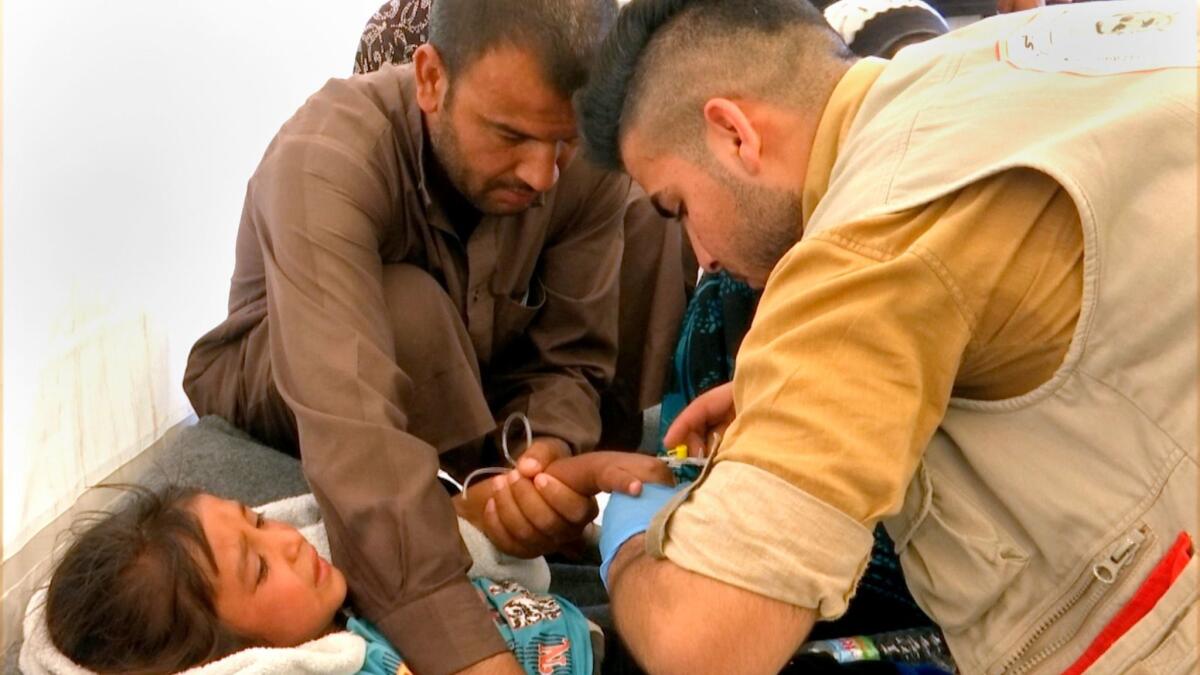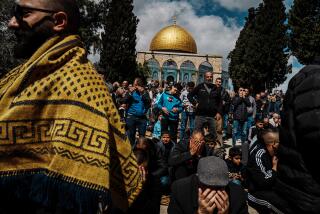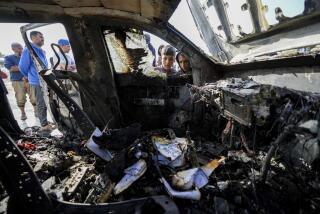Meal served at Iraqi refugee camp sickens more than 800 and causes at least one death, U.N. says

When Harbiyah Ahmad Nejem was presented with the hot plate of rice, chicken and bean stew, she saw it as a treat for her iftar, the daily breaking of the fast during the month of Ramadan.
The moment the muezzin’s evening call to prayer could be heard, the 47-year old refugee from the Iraqi city of Mosul, now a resident of the Hassan Sham U2 refugee camp, began to eat.
“I immediately felt bad the moment I ate it,” she said. She soon began to vomit.
She wasn’t the only one.
“Everyone in the camp began to shout, ‘tasamum, tasamum [poisoning],’” said Nejem.
At least one person died in the mass food poisoning that affected more than 800 people, causing acute vomiting and diarrhea, according to the United Nations. Aid officials sent some 600 people to surrounding hospitals.
A statement released earlier Tuesday by the United Nations High Commissioner for Refugees, said the organization was “extremely concerned by events at the camp.”
“Staff have been working closely overnight to coordinate the response with other agencies and the relevant authorities in the Kurdistan Region of Iraq and Baghdad to ensure that those who have fallen ill were able to receive swift medical treatment and that the seriously sick were provided transport to nearby hospitals,” the U.N.’s refugee agency said.
Hassan Sham, located some 21 miles east of Mosul, has taken in some 6,235 people who fled Mosul, now the focus of a fierce campaign to oust Islamic State from its bastion in the city.
The U.N. said at least one child had died and that a woman was in critical condition.
But Razgar Ubeid, the supervisor of the camps housing Mosul’s displaced, said that there had been no casualties among the 825 people affected.
“In any case, it was a disaster, and the police are now investigating the situation” Ubeid, who works for the Barzani Charity Foundation, said in an interview at the camp.
He said the money for the food had been donated by a Qatari charitable organization, the Sheikh Thani Bin Abdullah Foundation for Humanitarian Services, known as RAF. The meals had been prepared by a restaurant in Irbil, the capital of the Kurdish region, roughly 30 miles east of the camp.
“It seems the food had stayed for more than three hours in the transport vehicles by the time it was distributed,” said Ubeid.
Khaled Ghanem Mashaadeh, a father of five, pointed with barely disguised relief at his 6-year-old daughter, Yasseh, who was standing shyly by his side.
“I just got back from the hospital in Irbil. Yasseh had white froth coming out of her mouth,” he said in an interview at the camp.
“My two other boys are still recovering. They’re sleeping in the tent.”
Local media outlet Rudaw reported the restaurant owner had been arrested.
Ubeid explained that the camp had facilities for residents to prepare food on their own and that administrators had previously placed an injunction on aid organizations from bringing meals prepared from outside.
“But,” he said, “organizations complained we weren’t letting them distribute the charity they wanted to give. They wanted to make a special occasion, so we allowed it.”
“It’s now absolutely banned to bring meals like this. It’s better to donate money or give refugees frozen food or rations to prepare themselves.”
By Tuesday afternoon, almost all of the affected refugees had returned to Hassan Sham and the situation was “under control,” UNHCR spokeswoman Caroline Gluck said in a phone interview on Tuesday.
But that did not prevent Saudi Arabian media from portraying the incident as an example of malfeasance by Qatar.
The two countries have been locked in an escalating diplomatic clash in recent weeks, and commentators on television channels and newspapers owned in Saudi Arabia and other Gulf countries have worked overtime to depict Qatar as a dangerous upstart that must be put in its place.
On Tuesday, Saudi state-owned television channel Ekhbariyah posted images on its Twitter account showing sick children it claimed were from the Hassan Sham camp.
“They were poisoned,” said the earnest-sounding tweet, “by the terrorist Qatari ‘RAF’ organization with Iftar Ramadan meals.”
The RAF organization did not comment at time of writing.
twitter:@nabihbulos
ALSO
Corpses being dumped in Iraq show signs of torture, execution — and Iraqi forces may be responsible
Israel approves Palestinian move to pressure Hamas with electricity cuts
Islamic State rarely carries out terrorist attacks in Iran. How does Iran prevent them?
UPDATES:
12:50 p.m.: This article was updated throughout with Times reporting.
This article was originally published at 4:35 a.m.
More to Read
Start your day right
Sign up for Essential California for news, features and recommendations from the L.A. Times and beyond in your inbox six days a week.
You may occasionally receive promotional content from the Los Angeles Times.







